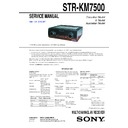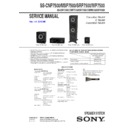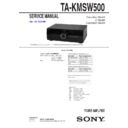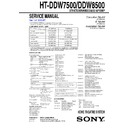Sony HT-DDW7500 / HT-DDW8500 / STR-KM7500 Service Manual ▷ View online
SERVICE MANUAL
Sony Corporation
Audio & Video Business Group
Published by Sony EMCS (Malaysia) PG Tec
STR-KM7500
MULTI CHANNEL AV RECEIVER
9-890-524-05
2010G08-1
©
2010.07
Canadian Model
E Model
Australian Model
Ver. 1.4 2010.07
• STR-KM7500 is the receiver section in HT-DDW7500/DDW8500.
– Continued on next page –
SPECIFICATIONS
Amplifi er section
Power Output
Models of area code SAF, AUS, E51, EA, CND
Stereo mode output (rated) (6 ohms, 1 kHz,
THD 1%)
Power Output
Models of area code SAF, AUS, E51, EA, CND
Stereo mode output (rated) (6 ohms, 1 kHz,
THD 1%)
100 W + 100 W
1)
Surround mode output (reference)
2)
RMS
output
FRONT:
185 W per channel
1)
(with SS-MSP7500)
CENTER: 185
W
1)
(with SS-CNP7500)
SURROUND:
185 W per channel
1)
(with SS-SRP7500)
SURROUND BACK: 185 W per channel
1)
(with SS-SRP7500)
1)
Measured under the following conditions:
Area code
Power requirements
E51, SAF
240 V AC, 50 Hz
EA
127 V AC, 60Hz
AUS
230 V AC, 50 Hz
CND
120 V AC, 60Hz
2)
Reference power output for front, center, sur-
round and surround back speakers. Depending
on the sound fi eld settings and the source, there
may be no sound output.
on the sound fi eld settings and the source, there
may be no sound output.
Inputs
Analog
Analog
Sensitivity: 800 mV/50
kohms
kohms
Digital (Coaxial)
Impedance: 75 ohms
Outputs (Analog)
AUDIO OUT
AUDIO OUT
Voltage: 800 mV/10 kohms
SUBWOOFER
Voltage: 2 V/1 kohm
Tone
Gain levels
Gain levels
±6 dB, 1 dB step
Reproduction frequency range:
28 – 20,000 Hz
FM tuner section
Tuning range
Tuning range
87.5 – 108.0 MHz
Antenna
FM wire antenna
Antenna terminals
75 ohms, unbalanced
Intermediate frequency
10.7 MHz
This receiver incorporates Dolby* Digital and Pro Logic Surround and the DTS** Digital Surround System.
* Manufactured under license from Dolby Laboratories. Dolby, Pro Logic, and the double-D symbol are trademarks of Dolby Laboratories.
** Manufactured under license under U.S. Patent #’s: 5,451,942; 5,956,674; 5,974,380; 5,978,762; 6,226,616; 6,487,535; 7,003,467; 7,212,872 & other
** Manufactured under license under U.S. Patent #’s: 5,451,942; 5,956,674; 5,974,380; 5,978,762; 6,226,616; 6,487,535; 7,003,467; 7,212,872 & other
U.S. and worldwide patents issued & pending. DTS, DTS Digital Surround, ES, and Neo:6 are registered trademarks and the DTS logos, Symbol and
DTS 96/24 are trademarks of DTS, Inc. © 1996-2007 DTS, Inc. All Rights Reserved.
DTS 96/24 are trademarks of DTS, Inc. © 1996-2007 DTS, Inc. All Rights Reserved.
This receiver incorporates High-Defi nition Multimedia Interface (HDMITM) technology.
HDMI, the HDMI logo and High-Defi nition Multimedia Interface are trademarks or registered trademarks of HDMI Licensing LLC.
HDMI, the HDMI logo and High-Defi nition Multimedia Interface are trademarks or registered trademarks of HDMI Licensing LLC.
“x.v.Colour” and “x.v.Colour” logo are trademarks of Sony Corporation.
“BRAVIA” and
are trademarks of Sony Corporation.
AM tuner section
Tuning range
Tuning range
Area code
Tuning scale
10 kHz step 9 kHz step
E51, AUS, CND
530 – 531 –
1,710 kHz 1,710 kHz
1,710 kHz 1,710 kHz
SAF
530 – 531 –
1,610 kHz 1,602 kHz
1,610 kHz 1,602 kHz
EA
531 –
1,602 kHz
1,602 kHz
Antenna (aerial)
Loop antenna (aerial)
Intermediate frequency
450 kHz
Video section
Inputs/Outputs
Video:
Inputs/Outputs
Video:
1 Vp-p, 75 ohms
COMPONENT VIDEO:
Y: 1 Vp-p, 75 ohms
PB/CB: 0.7 Vp-p, 75 ohms
PR/CR: 0.7 Vp-p, 75 ohms
80 MHz HD Pass Through
PB/CB: 0.7 Vp-p, 75 ohms
PR/CR: 0.7 Vp-p, 75 ohms
80 MHz HD Pass Through
STR-KM7500
Ver. 1.2
SAFETY-RELATED COMPONET WARNING!
COMPONENTS IDENTIFIED BY MARK 0 OR DOTTED LINE
WITH MARK 0 ON THE SCHEMATIC DIAGRAMS AND IN
THE PARTS LIST ARE CRITICAL TO SAFE OPERATION.
REPLACE THESE COMPONENTS WITH SONY PARTS
WITH MARK 0 ON THE SCHEMATIC DIAGRAMS AND IN
THE PARTS LIST ARE CRITICAL TO SAFE OPERATION.
REPLACE THESE COMPONENTS WITH SONY PARTS
WHOSE PART NUMBERS APPEAR AS SHOWN IN THIS
MANUAL OR IN SUPPLEMENTS PUBLISHED BY SONY.
MANUAL OR IN SUPPLEMENTS PUBLISHED BY SONY.
Design and specifi cations are subject to change
without notice.
without notice.
About area codes
The area code of the receiver you purchased is
shown on the lower right portion of the rear panel
(see the illustration below).
shown on the lower right portion of the rear panel
(see the illustration below).
Any differences in operation, according to the area
code, are clearly indicated in the text, for example,
“Models of area code AA only”.
code, are clearly indicated in the text, for example,
“Models of area code AA only”.
DVD IN
BD IN
OUT
DCSV
50mA MAX
50mA MAX
OUT
OUT
D BACK
SURROUND
FRONT
L
R
L
R
HDMI
SPEAKERS
SYSTEM CONTROL
Area code
General
Power requirements
Power requirements
Area code
Power requirements
AUS
230 V AC, 50 Hz
SAF
230 – 240 V AC, 50/60 Hz
E51
120/220/240 V AC, 50/60 Hz
CND
120 V AC, 60Hz
EA
120 – 127/220/
230 – 240 V AC 50/60Hz
230 – 240 V AC 50/60Hz
Power output (DIGITAL MEDIA PORT)
DC OUT:
DC OUT:
5 V, 0.7 A MAX
System Control output
DC OUT:
DC OUT:
5 V, 50mA MAX
Power consumption
• STR-KM7500
Area code
Area code
Power consumption
AUS, E51, CND, SAF,
EA
220W
• TA-KMSW500
Area code
Area code
Power consumption
AUS, E51,SAF, EA
160W
CND
190W
Power consumption (during standby mode)
0.3 W (when “CTRL:
HDMI” in HDMI menu is
set to “CTRL OFF”)
HDMI” in HDMI menu is
set to “CTRL OFF”)
Dimensions (width/height/depth) including
projecting parts and controls (Approx.)
Receiver
projecting parts and controls (Approx.)
Receiver
430 × 158 × 342 mm
(17 × 6 1/4 × 13 1/2 in)
(17 × 6 1/4 × 13 1/2 in)
Power
amplifi er
430 × 158 × 332 mm
(17 × 6 1/4 × 13 1/8 in)
(17 × 6 1/4 × 13 1/8 in)
Mass (Approx.)
Receiver
Receiver
8.0 kg (17 lb 11 oz)
Power
amplifi er
6.6 kg (14 lb 9 oz)
• Abbreviation
AUS : Australian model
CND : Canadian model
EA
AUS : Australian model
CND : Canadian model
EA
: Saudi Arabia model
E51 : Chilean and Peruvian models
SAF : South African model
SAF : South African model
STR-KM7500
3
SECTION 1
SERVICING NOTES
UNLEADED SOLDER
Boards requiring use of unleaded solder are printed with the lead-
free mark (LF) indicating the solder contains no lead.
(Caution: Some printed circuit boards may not come printed with
Boards requiring use of unleaded solder are printed with the lead-
free mark (LF) indicating the solder contains no lead.
(Caution: Some printed circuit boards may not come printed with
the lead free mark due to their particular size)
: LEAD FREE MARK
Unleaded solder has the following characteristics.
• Unleaded solder melts at a temperature about 40 °C higher
• Unleaded solder melts at a temperature about 40 °C higher
than ordinary solder.
Ordinary soldering irons can be used but the iron tip has to be
applied to the solder joint for a slightly longer time.
applied to the solder joint for a slightly longer time.
Soldering irons using a temperature regulator should be set to
about 350 °C.
Caution: The printed pattern (copper foil) may peel away if the
about 350 °C.
Caution: The printed pattern (copper foil) may peel away if the
heated tip is applied for too long, so be careful!
• Strong viscosity
Unleaded solder is more viscou-s (sticky, less prone to fl ow)
than ordinary solder so use caution not to let solder bridges
occur such as on IC pins, etc.
than ordinary solder so use caution not to let solder bridges
occur such as on IC pins, etc.
• Usable with ordinary solder
It is best to use only unleaded solder but unleaded solder may
also be added to ordinary solder.
also be added to ordinary solder.
NOTE OF REPLACING THE IC3511 AND IC3513 ON
THE HDMI BOARD
IC3511 and IC3513 on the HDMI board cannot exchange with sin-
gle. When IC3511 and IC3513 on the HDMI board are damaged,
exchange the entire mounted board.
THE HDMI BOARD
IC3511 and IC3513 on the HDMI board cannot exchange with sin-
gle. When IC3511 and IC3513 on the HDMI board are damaged,
exchange the entire mounted board.
Notes on chip component replacement
•
•
Never reuse a disconnected chip component.
•
Notice that the minus side of a tantalum capacitor may be dam-
aged by heat.
aged by heat.
TABLE OF CONTENTS
1.
SERVICING NOTES............................................. 3
2. DISASSEMBLY
2-1. Disassembly Flow .............................................................. 4
2-2. Case .................................................................................... 4
2-3. Back Panel Block ............................................................... 5
2-4. Front Panel Block .............................................................. 5
2-5. Main Block ........................................................................ 6
2-6. Heatsink Block, Main Board ............................................. 6
2-2. Case .................................................................................... 4
2-3. Back Panel Block ............................................................... 5
2-4. Front Panel Block .............................................................. 5
2-5. Main Block ........................................................................ 6
2-6. Heatsink Block, Main Board ............................................. 6
3.
TEST MODE .......................................................... 7
4.
ELECTRICAL CHECK ......................................... 9
5. DIAGRAMS
5-1. Block Diagram — Display Section — .............................11
5-2. Block Diagram — Video Section — ............................... 12
5-3. Block Diagram — HDMI Section — .............................. 13
5-4. Block Diagram — Standby dcdc Section — ................... 14
5-5. Block Diagram — Digital (1/2) Section — ..................... 15
5-6. Block Diagram — Digital (2/2) Section — ..................... 16
5-7. Block Diagram — Connection Section — ...................... 17
5-8. Block Diagram — Main Section — ................................ 18
5-9. Printed Wiring Board — Main Board — ......................... 20
5-10. Schematic Diagram — Main Board (1/4) — ................... 21
5-11. Schematic Diagram — Main Board (2/4) — ................... 22
5-12. Schematic Diagram — Main Board (3/4) — ................... 23
5-13. Schematic Diagram — Main Board (4/4) — ................... 24
5-14. Printed Wiring Board — Video Board — ........................ 25
5-15. Schematic Diagram — Video Board — ........................... 26
5-16. Printed Wiring Board — Video 2 Board —. .................... 27
5-17. Schematic Diagram — Video 2 Board — ........................ 28
5-18. Printed Wiring Board — HDMI Board (1/2) — .............. 29
5-19. Printed Wiring Board — HDMI Board (2/2) — ............. 30
5-20. Schematic Diagram — HDMI Board (1/2) — ................. 31
5-21. Schematic Diagram — HDMI Board (2/2) — ................. 32
5-22. Printed Wiring Board — Standby DCDC Board — ........ 33
5-23. Schematic Diagram — Standby DCDC Board — ........... 34
5-24. Printed Wiring Board — Display Board — ..................... 35
5-25. Schematic Diagram — Display Board — ........................ 36
5-26. Printed Wiring Board — Digital Board (1/2) — ............. 37
5-27. Printed Wiring Board — Digital Board (2/2) — ............. 38
5-28. Schematic Diagram — Digital Board (1/4) — ................ 39
5-29. Schematic Diagram — Digital Board (2/4) — ................ 40
5-30. Schematic Diagram — Digital Board (3/4) — ................ 41
5-31. Schematic Diagram — Digital Board (4/4) — ................ 42
5-32. Printed Wiring Board — Connection Board — ............... 43
5-33. Schematic Diagram — Connection Board — .................. 44
5-34. Printed Wiring Board — Headphone Board — ............... 45
5-35. Schematic Diagram — Headphone Board — .................. 45
5-36. Printed Wiring Board — Power Key Board — ............... 45
5-37. Schematic Diagram — Power Key Board — .................. 45
5-38. Printed Wiring Board — Thermal Sensor Board — ........ 46
5-39. Schematic Diagram — Thermal Sensor Board — ........... 46
5-40. Printed Wiring Board — AC Select Board — ................. 47
5-41. Schematic Diagram — AC Select Board — .................... 47
5-2. Block Diagram — Video Section — ............................... 12
5-3. Block Diagram — HDMI Section — .............................. 13
5-4. Block Diagram — Standby dcdc Section — ................... 14
5-5. Block Diagram — Digital (1/2) Section — ..................... 15
5-6. Block Diagram — Digital (2/2) Section — ..................... 16
5-7. Block Diagram — Connection Section — ...................... 17
5-8. Block Diagram — Main Section — ................................ 18
5-9. Printed Wiring Board — Main Board — ......................... 20
5-10. Schematic Diagram — Main Board (1/4) — ................... 21
5-11. Schematic Diagram — Main Board (2/4) — ................... 22
5-12. Schematic Diagram — Main Board (3/4) — ................... 23
5-13. Schematic Diagram — Main Board (4/4) — ................... 24
5-14. Printed Wiring Board — Video Board — ........................ 25
5-15. Schematic Diagram — Video Board — ........................... 26
5-16. Printed Wiring Board — Video 2 Board —. .................... 27
5-17. Schematic Diagram — Video 2 Board — ........................ 28
5-18. Printed Wiring Board — HDMI Board (1/2) — .............. 29
5-19. Printed Wiring Board — HDMI Board (2/2) — ............. 30
5-20. Schematic Diagram — HDMI Board (1/2) — ................. 31
5-21. Schematic Diagram — HDMI Board (2/2) — ................. 32
5-22. Printed Wiring Board — Standby DCDC Board — ........ 33
5-23. Schematic Diagram — Standby DCDC Board — ........... 34
5-24. Printed Wiring Board — Display Board — ..................... 35
5-25. Schematic Diagram — Display Board — ........................ 36
5-26. Printed Wiring Board — Digital Board (1/2) — ............. 37
5-27. Printed Wiring Board — Digital Board (2/2) — ............. 38
5-28. Schematic Diagram — Digital Board (1/4) — ................ 39
5-29. Schematic Diagram — Digital Board (2/4) — ................ 40
5-30. Schematic Diagram — Digital Board (3/4) — ................ 41
5-31. Schematic Diagram — Digital Board (4/4) — ................ 42
5-32. Printed Wiring Board — Connection Board — ............... 43
5-33. Schematic Diagram — Connection Board — .................. 44
5-34. Printed Wiring Board — Headphone Board — ............... 45
5-35. Schematic Diagram — Headphone Board — .................. 45
5-36. Printed Wiring Board — Power Key Board — ............... 45
5-37. Schematic Diagram — Power Key Board — .................. 45
5-38. Printed Wiring Board — Thermal Sensor Board — ........ 46
5-39. Schematic Diagram — Thermal Sensor Board — ........... 46
5-40. Printed Wiring Board — AC Select Board — ................. 47
5-41. Schematic Diagram — AC Select Board — .................... 47
6.
EXPLODED VIEWS
6-1. Front Panel Section .......................................................... 61
6-2. Back Panel Section .......................................................... 62
6-3. Main
6-2. Back Panel Section .......................................................... 62
6-3. Main
Section
.................................................................... 63
7.
ELECTRICAL PARTS LIST ......................... 64
STR-KM7500
4
SECTION 2
DISASSEMBLY
• This set can be disassembled in the order shown below.
2-1. DISASSEMBLY FLOW
Note: Follow the disassembly procedure in the numerical order given.
2-2. CASE
2-2. CASE
(Page
(Page
4)
2-3. BACK PANEL BLOCK
(Page
(Page
5)
2-4. FRONT PANEL BLOCK
(Page
(Page
5)
2-5. MAIN
BLOCK
(Page
6)
2-6. HEATSINK BLOCK, MAIN BOARD
(Page
(Page
6)
SET
1
three screws
(BVTP3
u 8)
4
case
2
two screws
(BVST4
u 8)
2
two screws
(BVST4
u 8)
3
3




